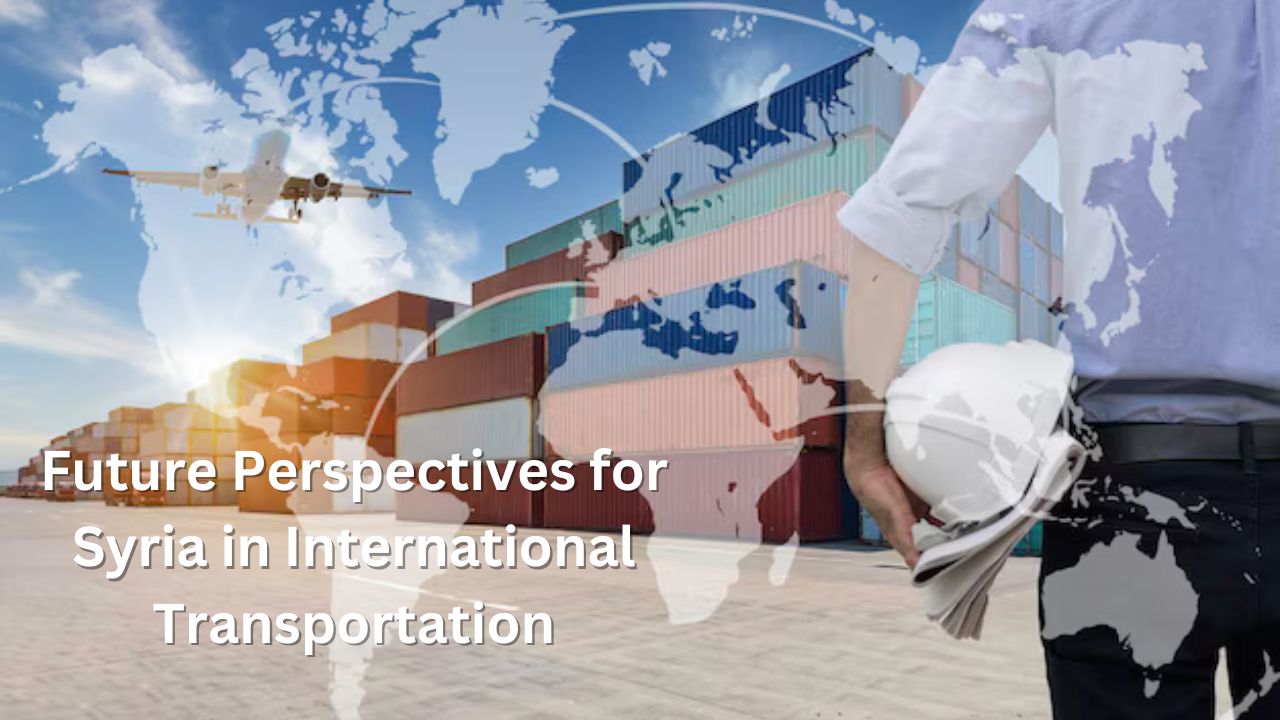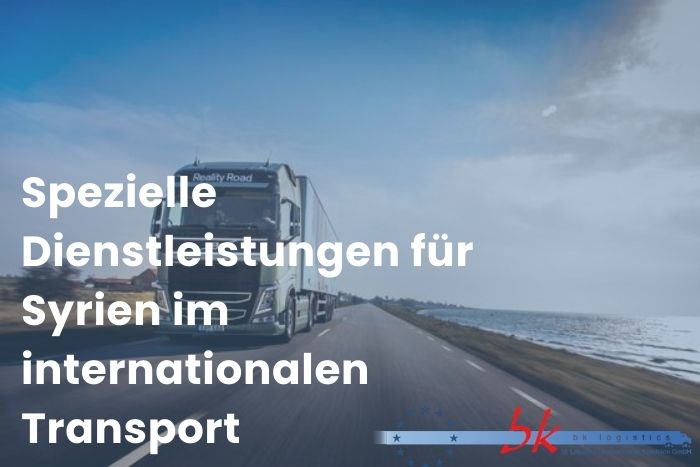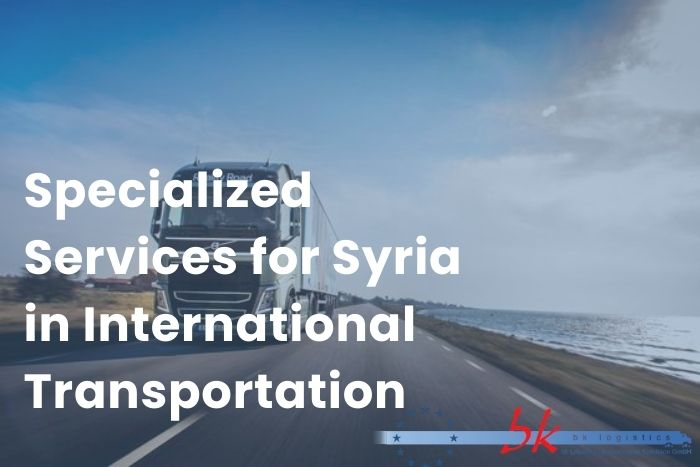News
Specialized Services for Syria in International Transportation
Syria has been grappling with a prolonged civil war and political uncertainty. This situation necessitates specialized solutions and services in the international transportation sector. Transportation services targeting Syria must be designed to suit the region’s challenges and take local conditions into account. International transportation companies offering tailored solutions for Syria contribute to reviving trade in the region by providing a secure, fast, and effective transportation process.
Transportation to Syria should integrate not only road transport but also sea transport and air transport. This integration makes transportation more efficient and flexible. While sea transport is conducted through Syria’s key ports, road transport can be facilitated by optimally utilizing local infrastructure. Additionally, air transport offers faster solutions, enabling the resumption of trade that relies on time-sensitive factors.
Tailored Security and Route Solutions for Syria
The security situation in Syria’s interior regions changes constantly due to the war. Therefore, security must be one of the top priorities in transportation services to Syria. Security measures should be implemented at every stage of the transportation process, and international transportation companies must develop strategies to minimize security risks. During transit through Syria’s high-risk areas, transport vehicles are often protected by armed escorts, enhancing the safety of the transportation process.
Specialized companies identify secure routes in Syria, offering the fastest possible path with the least risk. Determining alternative routes is essential to optimize security risks and transport times. Especially for cargo passing through conflict zones, these routes are meticulously selected by specialized companies.
Customs and Logistics Support in International Transportation
A significant aspect of international transportation to Syria involves customs procedures and local regulations. Syria applies specific customs procedures and laws for both local and international transport. Expert transportation companies are well-versed in these regulations and procure all necessary permits and documents accurately. Any disruptions during customs procedures can lead to delays and additional costs in the transportation process, making precise customs management crucial.
In international transportation, tailored logistics solutions for Syria are vital to ensure the secure and timely delivery of cargo. Transportation companies contribute to reviving trade by offering the fastest solutions for customs processes. They also collaborate with local logistics providers to offer support at every stage of the transportation process.
Digital Solutions for Fast and Efficient Delivery
In international transportation, digital solutions play a significant role in enhancing speed and efficiency. In transportation processes targeting Syria, digital technologies such as real-time tracking systems and artificial intelligence help accelerate transportation. These digital solutions monitor every phase of the transportation process, instantly detect potential issues, and provide solution proposals. Additionally, transportation routes and vehicles can be optimized using digital systems, reducing transport times.
Specialized companies make the entire transportation process transparent and efficient by handling bookings and tracking via digital platforms. These digital solutions offer a better experience for both transportation companies and cargo owners, making transportation processes faster and safer.
The Future of International Transportation in Syria
Syria is a key transportation hub in the Middle East, and transportation in the region plays a critical role in revitalizing global trade. International transportation companies can reshape trade in the region by offering tailored solutions for Syria. This supports not only Syria’s economic development but also increases trade with other countries in the region.
In particular, companies in the international transportation sector can enhance the efficiency of transportation processes by establishing new collaborations and integrating digital technologies. This process can revive trade in the region and position the Middle East as a center for global trade.
Offering specialized services for Syria in international transportation not only ensures secure and fast transport but also aids in revitalizing trade in the region. Security measures, digital solutions, logistics support, and customs procedures make transportation to Syria more efficient and secure. Specialized companies, with these tailored services, can foster both regional economic development and the growth of global trade.

Perspectives for the Future of International Transportation in Syria
The ongoing civil war and political uncertainties in Syria create both significant opportunities and challenges in the international transportation sector. The future of international transportation depends on several factors, including the stabilization of the region, improvements to infrastructure, and increased collaboration between local and international stakeholders. The growing use of digitalization and automation will enable companies to further enhance efficiency and security.
A key issue will be the modernization of Syria’s infrastructure. Despite ongoing political uncertainties, various international organizations and governments are supporting projects to rebuild and modernize infrastructure. These projects include the development of critical infrastructure such as ports, airports, and road networks, which are vital for the future of international trade. These advancements will make the transportation of goods faster and more cost-effective, increasing capacity for international trade.
Another significant factor will be the increasing use of intelligent transportation systems (ITS). These technologies improve route planning, enhance cargo tracking precision, and optimize resource utilization. Future logistics solutions, such as the use of autonomous vehicles and drones as innovative transportation methods, will not only shorten delivery times but also significantly reduce costs.
The Role of International Collaboration in Transportation
The role of international collaborations will be pivotal in shaping the future of Syria’s transportation market. Close cooperation between local and international transportation companies will enable the development of logistics solutions tailored to Syria’s specific needs. These collaborations facilitate the creation of secure transportation corridors and offer customized solutions suited to various trade requirements.
A successful example of collaboration could be the creation of green logistics solutions through partnerships between international transportation companies and local firms in Syria. Given the global rise in demand for sustainability, companies employing eco-friendly transportation methods could position Syria as a model for sustainable logistics in the Middle East. Such collaboration not only makes transportation more efficient but also promotes environmental awareness and sustainability in the region.
Capacity Expansion and Resource Utilization
The success of international transportation to Syria depends on capacity expansion and the efficient use of resources. Companies must continuously expand their logistics capacities to meet the rising demand for international shipments. This requires not only expanding warehouse capacity but also optimizing cargo management systems to ensure accurate and swift deliveries.
Expanding storage capacity and utilizing supply chain technologies are essential to meet the growing demands in transportation. At this point, companies not only optimize their own logistics networks but can also leverage their partners’ infrastructure to make deliveries faster.
Security Solutions and Risk Management in International Transportation
In international transportation to Syria, security and risk management remain among the most critical elements. Given the geopolitical uncertainties in the region, companies transporting to Syria must develop advanced security solutions. This includes not only security measures but also the use of tracking systems for real-time cargo monitoring to detect potential threats early.
Developing such security solutions is becoming increasingly important to ensure the safety of international transportation and build trust between governments and companies. Additionally, companies will need to develop risk management strategies tailored to the region’s unique challenges, ensuring a seamless transportation process.
Conclusion and Future Perspectives for Syria
The future of international transportation to Syria is shaped by significant opportunities and challenges. Improving infrastructure, leveraging technologies, establishing collaborations, and implementing security solutions will transform the transportation sector to contribute to the revival of trade in the region. Companies investing in Syria must respond to the growing demands of global trade with innovative solutions.
With infrastructure enhancements and the application of modern technologies, Syria will rapidly emerge as a key trade hub in the region. These developments in the logistics sector not only make transportation safer and more efficient but also support economic growth, strengthening Syria’s position in global trade.



